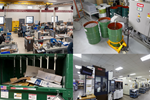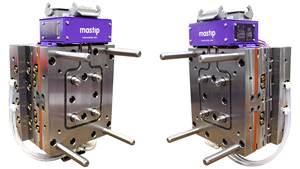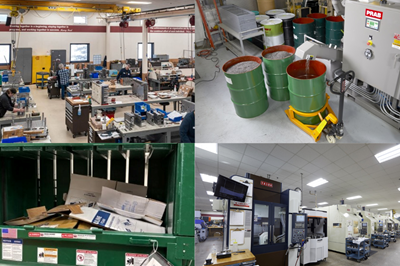StackTeck establishes iMFLUX Center of Excellence
StackTeck has adopted the iMFLUX process to control the injection molding process for PCR projects that bring material viscosity challenges.
StackTeck Systems Ltd., a global manufacturer of high-volume injection molding solutions, is introducing services in support of adoption of the iMFLUX process — an adaptive technology that injects material into the mold through low constant pressure — in an effort to help customers overcome the challenges of molding recycled materials.
StackTeck says it has embraced the iMFLUX technology as a process control method that is capable of handling large and sudden material property variations in real time. Following the success of using this technology to qualify a range of post-consumer recycled (PCR) resin grades, StackTeck has received permission from Procter & Gamble to use and share this know-how that can be used for any iMFLUX-capable injection molding machine.
The iMFLUX process is cited as solving the following PCR challenges:
- High degree of variability in melt flow index (MFI). Solution: Injection molding process control (iMFLUX)
- Increased demands on balance and precision. Solution: Injection mold custom features
- Contaminants and impurities. Solution: Injection mold design for wear and cleaning
- Process and quality monitoring requirement. Solution: System control sensors and process control.
“The first time I saw the Automatic Viscosity Adjustment capability of iMFLUX, we did a material change from 40 MFI to 5 MFI polypropylene while running a big mold in one of our test machines,” Jordan Robertson, vice president of business development and marketing at StackTeck, says. “The iMFLUX controller adapted smoothly and flawlessly, and we didn’t see a short part — the machine kept running as if nothing had changed at all. Based on many years working with PCR resins for thin-wall PCR horticultural products, the power of this technology was evident.”
The iMFLUX process is a patented technology, belonging to Procter & Gamble, which uses a closed-loop control system to manage injection pressure during every molding cycle based on real-time measurement of the molten plastic in front of the screw in an injection molding machine. Pressure measurements are taken at a frequency of 1,000 hertz, and the control system manages the system to maintain a constant injection pressure, regardless of the potential for pressure variations that are caused by material property changes over time.
“We are taking a long term view on this initiative,” adds StackTeck president and CEO Vince Travaglini. “We have been dealing with PCR resins for specialty products like flower pots, paint cans, and rPET preforms for water bottles for many years, but today we see a much broader demand for it. In the coming years, I can see PCR applications growing from a few molds per year to a substantial proportion of the projects we are handling. As a result, we are working to adapt our mold test machines and qualification procedures to suit PCR projects, while also preparing to handle more projects for PCR resin qualifications. We see this as a strategically important step toward helping our customers move to more sustainable products.”
Material property fluctuations have significant implications for the molding process. As illustrated in the chart above, changes in resin between 30 MFI and 70 MFI result in injection pressure variations that lead to significant quality and efficiency issues in conventional injection molding systems. Such MFI swings can result in injection pressure changes as large as 20%, which can literally stall the cycle, or create scrap.
Using iMFLUX low constant pressure combined with “Auto Viscosity Adjust” (AVA) means that it can:
- Adapt in real time to material property variations by adjusting pressure
- Control dramatic variations in resin viscosity
- Process changes that are monitored and recorded
- Be used in concert with the scientific molding approach for consistent part quality
- Provide a significant productivity boost for PCR applications
StackTeck also works with industry partners including RJG, Trexel and top Tier machinery suppliers to offer the most advanced molding process capability that is available in the industry.
Related Content
Cube Mold Technology Advancing Injection Molding
Injection mold design features a central rotating cube that can split and counter-rotate, with additional gear elements on the exterior.
Read MoreLSR Platform Meets Critical Medical Molding Needs
NPE2024: Recent updates to Mastip’s Aquilo platform highlight how its design — from consistent thermal profile to uniform cooling — has made it successful for medical industry projects.
Read MoreMMT Chats: Molds, Molding, Marketing and Membership
MoldMaking Technology Editorial Director Christina Fuges chats with Eric Hecker, Sales and Project Engineer for Eifel about his focus on sales and marketing, the move into molding, technology and training trends and his mission to help increase membership in Mold Technologies Division of SPE. This episode is brought to you by ISCAR with New Ideas for Machining Intelligently.
Read MoreWhy Shoulder Bolts Are Too Important to Ignore (Part 1)
These humble but essential fasteners used in injection molds are known by various names and used for a number of purposes.
Read MoreRead Next
Molds for Thinner Cheaper Plastic
Procter & Gamble is now building a plastic processing plant to coincide with the formation of a new subsidiary called iMFLUX, Inc., whose team brings with it 150 years of experience to develop new plastics processing technology for injection molding.
Read MorePerspectives on Sustainability in Mold Building: A Diverse Outlook
In conversations with individuals involved in the mold building industry, a variety of perspectives on sustainability emerged, showcasing the multifaceted nature of the term.
Read MoreHow to Use Continuing Education to Remain Competitive in Moldmaking
Continued training helps moldmakers make tooling decisions and properly use the latest cutting tool to efficiently machine high-quality molds.
Read More






















